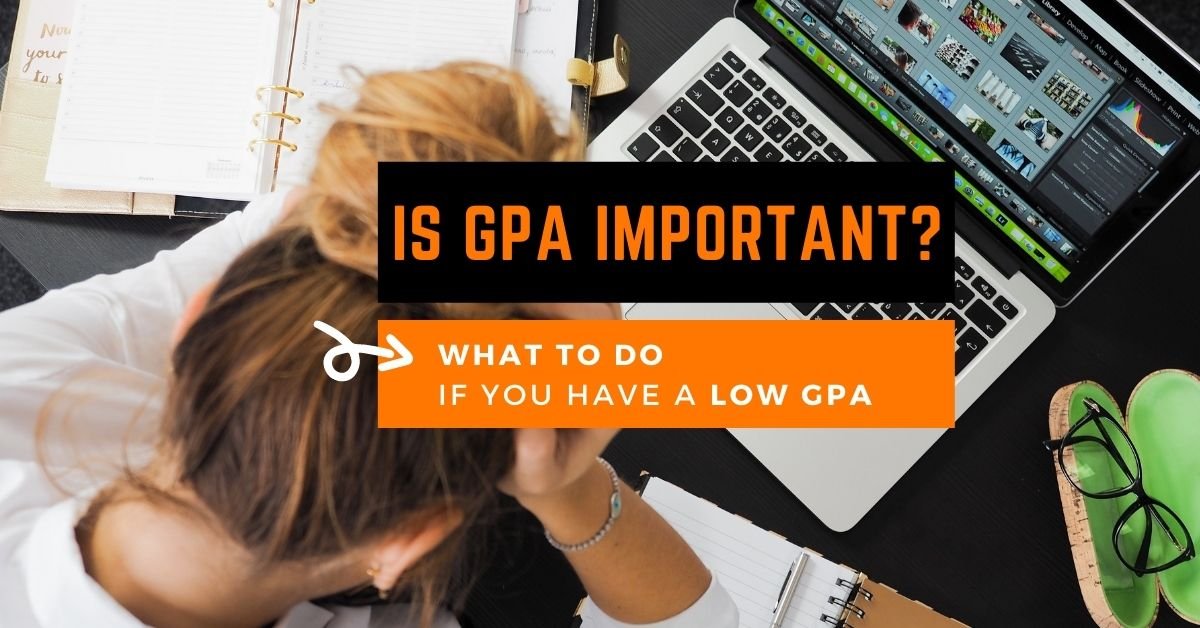Image: energepic


I’m sure most of us grew up thinking that only by doing well academically can we become successful in the future.
In schools, we are taught to ace exams with flying colours, and failures are frowned upon.
But is having a good Grade Point Average (GPA) all that important?
Jump ahead to
- The Point of Having Good Academic Grades
- Should You Even Aim For a High GPA?
- Benefits of Having a Good GPA
- To those that study hard but can’t seem to score good academic grades
- Why You Shouldn’t Just Focus on Academics
- What To Do If You Have a Low GPA?
- Important: If you ever give up on your GPA, don’t neglect or not participate in your group projects.
- My Personal Experience
- Conclusion
The Point of Having Good Academic Grades
In Singapore, we have a system of meritocracy, valuing good academic grades and achievements.
Whether you like it or not, GPA is one of the many ways the government or employers assess your suitability for a job, university placement, career success, and more.
A good GPA could indicate one’s ability, effort, and talent.
Someone once told me, “If you can’t even do well when your occupation is a student, how can others expect you to do well in a job?”
There is truth to it to a certain extent, but reality lies beyond that.
Some people struggle to obtain good grades, not because they aren’t capable, but for other reasons which we will explore below.
So, do good grades equate to a better future?
This article will explore the importance of GPA to one’s future, the benefits of having a good GPA, and what to do if you have a low GPA.
We’ll be primarily discussing the impact of GPA in Polytechnics and Institute of Technical Education (ITE) in Singapore.
Should You Even Aim For a High GPA?
Image: Tomas Ryant
It all depends on your plan for the future.
Here are a few questions to consider:
- Are you certain you’ll work straight after graduation? (Polytechnic/ITE)
- Are you planning to further your studies?
- Do you know what to do in the future?
- What is your passion?
If you already know that you’ll be working after graduation, and secured a job offer, GPA is probably not that important.
It’s almost negligible if you’re starting your own business.
Usually, recruiters will look at whether you successfully graduated from Polytechnic/ITE. If you have good results, you may include GPA in your resume or talk about it during the interview.
However, do be careful if you’re working straight after graduation. In case of an economic downturn, it could be hard for you to find a job.
If you have plans to study in university or progress to polytechnic after graduation, GPA is a main factor the admission panel will look at.
If you are still clueless about what you want to do in the future, I strongly suggest you aim for a high GPA.
A good GPA could act as a backup in case things don’t go according to your plan.
Lastly, what is your passion? Does what you love to do require a high GPA? Identifying your passion is integral to not hating what you do in the future.
Considering all these questions will ultimately help you answer “Is GPA Important?”.
Benefits of Having a Good GPA
Image: Pixabay
Priority to Secure That Internship or Student Exchange You Really Want
In Polytechnic/ITE, it is common to have an internship attachment as part of your semester in later years.
You’ll need to rank from a list of companies provided or source internships yourselves. You may also opt for an overseas internship.
With a good GPA, you’ll be given priority due to the limited number of positions available for respective companies.
Even in activities or events such as overseas community service, students with higher GPAs will be given priority.
Hence, if you really want a particular internship, you may or may not get it depending on your academic results and resume.
However, GPA is not always what schools look for. For example, my internship was under a program called Global Entrepreneurial Internship Program (GEIP).
Such internships look at your passion for a particular field or non-academic achievements. Even if you have a low GPA, you can still secure an overseas internship.
Chance For Scholarships And Grants
You could have your tuition fees sponsored by scholarships and grants – if you manage to secure one.
A higher GPA would mean that you’ll have a better chance of obtaining funding for your studies, and even additional allowances.
From my experience, there is a cut-off GPA for you to even obtain a scholarship interview.
In most scholarships, there is a minimum GPA for you to maintain in order to renew the scholarship.
You may not get scholarships and grants every year. Fret not if you aren’t able to obtain a scholarship or grant in your first year of studies. It is still possible for you to obtain it in the later years.
Guaranteed University or Polytechnic Placement
It’s a known fact that universities and polytechnics look at your academics to determine if you’re suitable for a spot in their schools.
It’ll be easier for you to secure a spot in university or polytechnic if you have a decently high GPA.
This is what I discovered nearing my graduation: You’ll be immediately offered a university spot without an interview if you meet the school’s GPA requirement.
This could be around a GPA of 3.8. (Maximum GPA you can achieve is 4.0)
Better Job Opportunities
With a high GPA, you may include the achievement in your resume. It could also be a talking point in your interviews.
For example, you could talk about how you balanced academics and extracurricular activities.
Moreover, recruiters in the public sector typically look at your academic achievements compared to the private sector, which looks for experience.
Imagine you’re a job recruiter. One applicant has a GPA of 3.7 and another has a GPA of 2.5, ceteris paribus (with all else being equal).
Who are you more likely to hire?
However, it might be a different case if the person with a lower GPA has a stellar school portfolio!
Sense of Accomplishment
Lastly, obtaining a good GPA could bring you personal benefits, such as self-satisfaction and a sense of accomplishment.
Additionally, a good GPA may indicate that you absorb your course’s modules better, meaning that you retain more knowledge on the contents taught.
To those that study hard but can’t seem to score good academic grades
Image: jeshoots
You’re not alone.
I have friends who just can’t seem to do well in examinations no matter how hard they study.
Be it your course isn’t suitable, particular modules just don’t interest you, or studying isn’t right for you; Don’t give up on everything.
During secondary school, I struggled with Pure Physics, consistently failing in tests. Eventually, I chose to switch to the easier combined physics with chemistry which was easier.
Physics is hard for me to grasp. You may find certain modules or subjects hard to understand. It may be because the module isn’t for you. It could also be because your course is harder compared to the others.
You don’t have to be good at everything.
Focus on other aspects and aim for improvement!
Why You Shouldn’t Just Focus on Academics
Even someone with a high GPA may lose to one with a good portfolio and leadership experience.
I know many people who enter university through aptitude, even though they didn’t have a high GPA.
By focusing solely on academics, you may miss out on other opportunities for development.
You’ll also neglect your hobbies, and may lose out on valuable memories that you could have made doing other activities.
Find a balance between your social life, academics, and extracurricular activities.
What To Do If You Have a Low GPA?
Chances are, there’s still time to pull up your GPA.
You may use a CGPA calculator such as plsgrademe to get a sense of where you stand and what your academic goals should be.
It’ll be easier if you find a GPA calculator specific to your school.
To increase your GPA, you may try any of the following tips:
- Find a different way to study (change of environment)
- Study with your friends
- Ask your smart friends for help or study together (remember to treat them to a meal!)
- Try new methods of studying
- Ask your teachers for guidance
However, GPA isn’t everything
Don’t be disheartened if you can’t do well academically.
You’ll want to work on your strengths, learn new skills, and build up your portfolio.
Now’s a good time to figure out what field you’ll like to work in when you graduate if you haven’t already.
Build your portfolio according to your interests and strengths.
Read my article on 7 Ways You Can Build Your Portfolio in School, so that you can stand out from the crowd!
Important: If you ever give up on your GPA, don’t neglect or not participate in your group projects.
Image: Monstera
Here’s why.
Connections are extremely important after you graduate. It can take you to places.
You don’t want to have a bad reputation that will affect any of your possible future opportunities.
Furthermore, you don’t want it on your conscience when your group project mate isn’t able to enter university because his CGPA was brought down by the group project.
Always put yourself in others’ shoes and you’ll maintain good connections.
No one wants to be labelled as ‘the kid who does nothing’ and become ostracised.
My Personal Experience
In my first semester of Polytechnic, I scored a GPA of 3.6. This may seem high for some, but it was rather low for me as my course (Business) was extremely competitive.
I remember I couldn’t even get an interview for a scholarship until I increased my GPA and improved my portfolio in my final year.
Find Out What Works For You
I subsequently changed my environment for studying (studied in school and with friends). I also started to join CCAs, participate in external competitions, started businesses, and took on leadership roles.
With a good portfolio and a decently high GPA of 3.8188 (no diploma with merit), I finally managed to obtain a scholarship in my final year of poly.
I realised after I graduated from Polytechnic that GPA still holds a significant amount of weight when applying for university admissions and scholarships.
The cut-off GPA for university admissions changes every year, but it’s around 3.5. However, with a good school portfolio, you may enter almost any university through aptitude.
University scholarships are on another level, though. They usually require a Diploma with Merit (top 10% of the cohort based on GPA) to even qualify.
Nearing graduation, I received early admission to NUS through entrepreneurship aptitude and admission to SMU through GPA. (All without interview)
Unfortunately, I received almost no chances for a scholarship interview.
You may find yourself like me or struggling to gain admission to a university/polytechnic.
Whatever GPA you may have, my advice is that you should always aim to build up your portfolio.
A good portfolio stays consistent and can help you in the future, regardless of what stage of life you are in.
Conclusion
So, is GPA important?
GPA still plays a relatively important role in Singapore, but it’s not everything.
It’s one of the factors schools and recruiters look at when deciding if you’re suitable for a position/opportunity.
If you plan to work after graduation or start your own business, GPA is probably not significant and one of your lower priorities.
Don’t stress too much if your GPA doesn’t make the cut. You should focus on other aspects such as learning new skills and building up your portfolio.
With a good portfolio, it’ll still take you places.
If you have a Diploma with Merit and an amazing portfolio, congratulations. You’ll find many amazing opportunities open to you that others would die for.
I hope that my tips and experiences can help you in your endeavours!
We’d LOVE to Feature You!
Your experiences are highly valued by others.
You Deserve to Make Better Decisions.
Receive summaries of experiences & guides, from those who’ve been there, done that.
If you like our content, we’d appreciate it if you could follow us on our social platforms!
It’ll bring us one step closer to equipping everyone with knowledge to make better decisions.
About the Author
Jonas Ngoh loves to give advice based on his experiences. Feel free to talk to him!









